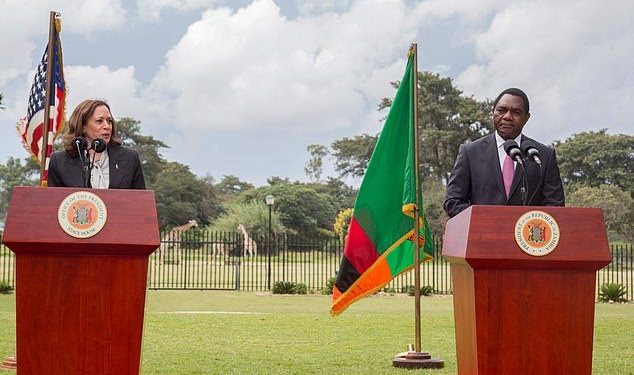
Zambia president Hakainde Hichilema and US vice-president Kamala Harris in Lusaka. - Source: Salim Dawood/AFP via Getty Images
Leaders from around the world have been outrightly expressing their disapproval of the USA playing captain on major global social economic issues.
By Mpandashalo Mwewa.
Lusaka – The geopolitical landscape seems to be pretty heated up at the moment. So it’s strange to see the new dawn administration aligning Zambia with the USA and yet, it’s surprised that our urgent debt restructuring process has stalled or that the economy has taken its nose dive.
It’s written all over the wall that several nations have been taking collective measures to steer away from the US Dollar, for instance. In fact, leaders from around the world have been outrightly expressing their disapproval of the USA playing captain on major global social economic issues.
Also Read: Zambia must abandon the IMF Programme – Amb. Mwamba.
Here, then, are five recent events that should make State House realise that power is tilting towards the East so it’s naive to put Zambia’s eggs in the US basket.
◾Saudi Arabia Cutting Ties With The U.S. For Economic Independence.
A recent Wall Street Journal report brought to light that Saudi Arabia’s Crown Prince recently told his associates that he is no longer interested in pleasing the U.S. In fact, according to unnamed people familiar with the conversation, he asserted that he wants “something in return” for anything he gives out to Washington.
In a surprising move, Saudi Arabia and the OPEC+ group of producers have announced a cut in oil production of approximately 1.6 million barrels per day. While the move is aimed at achieving market stability, according to a recent report from the Financial Times, Saudi Arabia is attempting to adopt an economic strategy that is independent of the United States.
◾The 5 BRICS Nations Now Contribute More To World GDP Than The G7.
The Covid-19 pandemic served as a watershed moment in several ways, including marking the point when the global economic power dynamic changed in favour of developing countries.
Data shows that, beginning 2020, the BRICS nations as a whole now contribute more towards global Gross Domestic Product (GDP) than the G7 industrialised nations do, in terms of purchasing power parity (PPP).
◾U.S. Losing Influence As Saudi Arabia Joins Shanghai Cooperation Organization.
Oil is a major component of any economy and so what the oil producing giants are doing should interest us.
Saudi Arabia has recently been granted the status of a dialogue partner in the Shanghai Cooperation Organization (SCO), a China-led Asian security and economic bloc that includes Russia, India, Pakistan, and other major economic players. The kingdom could eventually be granted full membership.
The move is part of Saudi Arabia’s efforts to diversify its global partnerships. This month alone, Beijing mediated a landmark agreement between archfoes Iran and Saudi Arabia that could help significantly ease Middle East tensions.
Saudi Arabia also announced a $3.6 billion deal to buy 10% of China’s Rongsheng Petrochemical, which would see it supply 480,000 barrels per day of crude oil to the company.
As I had earlier pointed out, the decision by Saudi Arabia to adopt an economic strategy independent of the United States could have significant implications for the US and its relationship with the Middle East.
As the US rivalry with China and Russia intensifies in an increasingly polarized world, Saudi Arabia and other Middle Eastern nations are choosing to diversify their global partnerships so why should Zambia be seen to be a blue eyed boy of the US?
◾Several Countries Aiming To Ditch Dependency On The Dollar And Strengthen Bilateral Relations.
Over the past few years, there has been a trend of countries sidestepping the US dollar and choosing to use their own local currencies for bilateral trade.
In an emerging multi-polar world, Brazil and Japan, two close allies of the United States, have recently joined the trend by expanding their bilateral currency trade.
Brazil and China signed a deal last week to trade in their local currencies while Japan joined hands with sanctions-hit Russia to pay for its oil by breaching the $60 cap, thanks to a waiver from the US.
Saudi Arabia, one of the biggest exporters of crude, is contemplating trading with China in Saudi Riyals and Chinese Yuan.
For many analysts, this shift directly challenges the dominance of the US financial system – one of Washington’s most potent tools to exert influence worldwide.
One of the main topics of the next BRICS summit that will be held in South Africa in August aims to create a mechanism to trade settlements in national currencies among member states.
◾US Threatening To Cut Aid Over Gay Rights Infringements.
We must not forget that the, then, US Ambassador to Zambia, Daniel Foote, released a statement threatening possible cuts to the US$500m that Zambia receives annually in US aid.
Mr. Foote’s statement came after the, then, President Edgar Lungu threatened to send a letter of complaint to the administration of the, then, US President, Donald Trump, over the ambassador’s public criticism of Zambia for the imprisonment of two gay men, which sparked Western condemnation of Zambia’s human rights record. The two men were each given a 15-year sentence by a court for breaking laws forbidding homosexual relationships.
To date, the Conservative and Christian Zambia would rather forfeit international aid than change local laws forbidding homosexual relations. On this front, alone, there’s no point in taking Zambia closer to the US because the two nations don’t share the same values. Zambia is closer to the values shared in the East.
Tension may still escalate between the government and the US, which could lead to cuts in aid to the healthcare and education sectors should Zambia insist on upholding its traditional values that are even enshrined in the Constitution.
◾Conclusion.
From the above shared five bullet points, it’s clear that the monogamous relationship that the new dawn administration wishes to establish with the US is not a prudent route. We must adopt more open relationships around the world; strong with the US yes but equally strong with China, India, the UK, France and others!
And that’s how our visionary founding father, Dr. Kenneth Kaunda, implemented Zambia’s foreign policy – a Non-Aligned State.
Remember to follow us for well researched articles, political analyses and commentaries.
©2022 Woodpecker’s Digest Inc.










The new govt thought the US would help it reshape the already “sick” economy and outdo the PF infrastructure success.Even the Aid in the healthy sector comes mainly through economic sectors whose impact is minimal.China has been able to assist this in areas that are practical and do not come with inhuman conditions.Thanks fir your enlightening article. Hope the disgraced new dawn govt will read this and begin to bed towards the east.
Thank you for your feedback. This is one of several progressive ways of giving the new dawn government feedback.